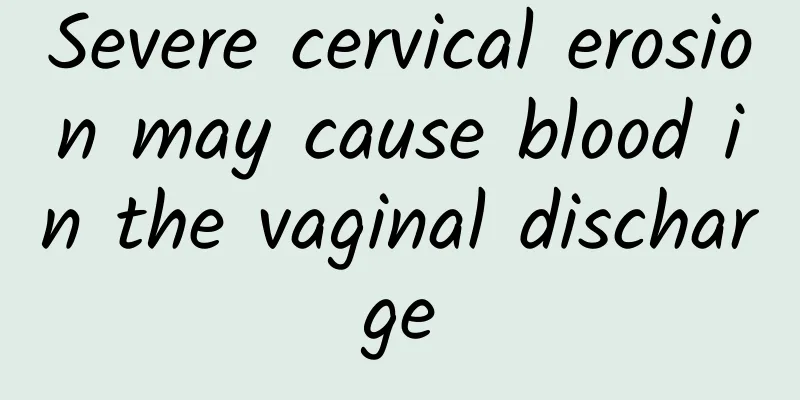When will uterine fibroids be removed? When will uterine fibroids be removed?

|
Under what circumstances will uterine fibroids be removed? Under what circumstances will the uterus be removed for uterine fibroids? Uterine fibroids are a common benign gynecological disease, and most patients do not require immediate surgical treatment. However, in some cases, doctors may recommend that patients undergo uterine fibroid removal surgery. This article will explore these situations and answer them one by one. 1. Large fibroids: When the size of uterine fibroids reaches a certain size, they may cause symptoms and affect the patient's quality of life. Usually, when the size of the fibroids exceeds 5 cm, the doctor may consider surgical removal. The main purpose of surgery is to relieve symptoms and reduce pain and discomfort. 2. Rapidly growing fibroids: Although most uterine fibroids grow slowly, in a few cases, the growth of fibroids may be abnormally rapid. If the fibroid increases in size by more than 50% in a short period of time, or shows a trend of rapid growth, the doctor may recommend surgical removal. This can prevent the tumor from continuing to expand and reduce the risk of other complications. 3. Ectopic fibroids: Some uterine fibroids grow outside the uterus, which is called ectopic fibroids. In this case, the fibroids may be attached to the surface of the uterus or connected to the uterus through the pedicle. Ectopic fibroids may cause discomfort and pain, and may even interfere with fertility. Therefore, doctors usually recommend that patients consider surgical removal. 4. Infertility: Uterine fibroids can lead to infertility or recurrent miscarriage. Although not all uterine fibroids affect fertility, surgical removal may be a solution for those who have fibroids that cause infertility or recurrent miscarriage. By removing the fibroids, the normal structure and function of the uterus can be restored, improving the chances of conception and pregnancy. 5. Cause severe symptoms: Sometimes, uterine fibroids may cause severe symptoms, such as severe pain, abnormally heavy menstrual bleeding, difficulty urinating, etc. These symptoms may seriously affect the patient's quality of life and even endanger their health. In this case, surgical removal may be the only option to relieve symptoms and protect the patient's health. Before deciding whether to perform surgery to remove the fibroids, your doctor will usually perform a comprehensive evaluation. This includes taking into account the size, location, and growth rate of the fibroids, as well as your symptoms and reproductive needs. Your doctor will also evaluate your overall health and the risks of surgery. With these evaluations, your doctor can develop the best treatment plan to meet your specific needs. Not all uterine fibroids require surgical treatment. When to remove uterine fibroids depends mainly on the size of the fibroids, the speed of growth, and whether it causes severe symptoms and infertility. Before deciding whether to undergo surgery, patients should fully communicate with their doctors to jointly develop the best treatment plan. |
<<: Why do uterine fibroids sometimes appear and sometimes disappear?
Recommend
Are the dangers of uterine fibroids terrible?
When it comes to diseases like uterine fibroids, ...
What medicine should be used for vaginal discharge that looks like tofu dregs? Determine the disease based on symptoms
Regarding the problem of leucorrhea that looks li...
What are the main harmful manifestations of pelvic inflammatory disease?
The high incidence of pelvic inflammatory disease...
How long can a woman have sex after cervical erosion surgery? What should women pay attention to when taking care of themselves after cervical erosion surgery?
After the surgical treatment of cervical erosion,...
Hand-fried brown sugar bubble tea? Nutritionist: 3 ways to reduce calories and increase nutrition
It was recently revealed that the brown sugar pea...
Can the baby be saved if ovarian cyst torsions during pregnancy?
When ovarian cyst torsion occurs during pregnancy...
Get rid of fat lines on the buttocks and legs by learning 3 quick firming exercises
Many women love beauty and cannot tolerate even a...
How to do dietary care for miscarriage
Life always plays jokes on us. Sometimes we want ...
Menstrual irregularities will also cause changes in complexion in the early stages
In the early stage of menstrual irregularity, the...
Get rid of your belly in spring with ultrasonic body sculpting, a new magic weapon
As the temperature gradually rises in spring, man...
What harm will cervical warts cause to patients
As the saying goes, what you fear will come true....
Experts analyze the common causes of chronic pelvic inflammatory disease
The cause of chronic pelvic inflammatory disease ...
What are the causes of secondary dysmenorrhea?
Do you know what the cause of secondary dysmenorr...
What are the symptoms of spontaneous abortion
Spontaneous abortion is a type of abortion that i...
What are the preventive measures for irregular menstruation?
Irregular menstruation is one of the common probl...









